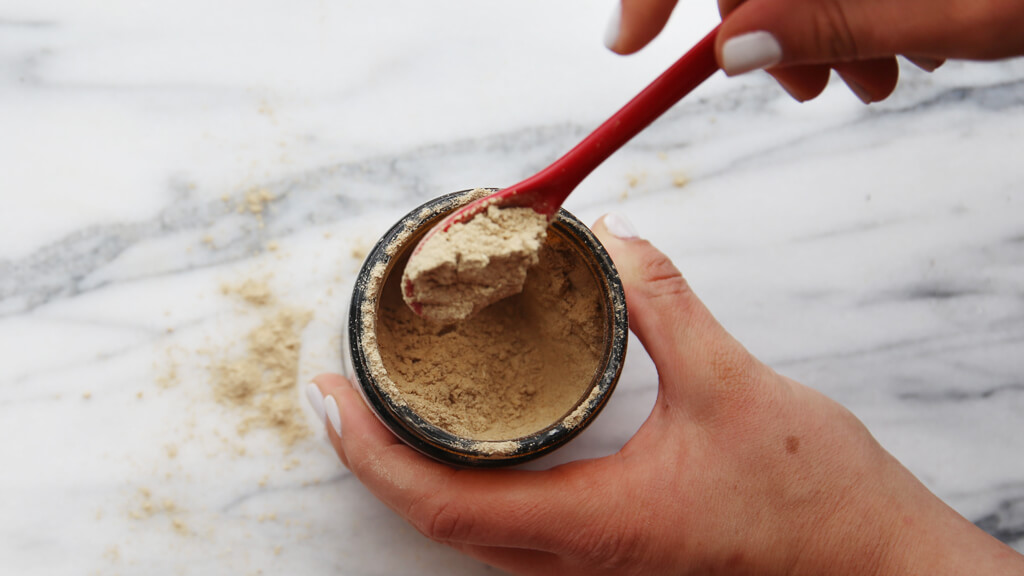Nourish
WHAT, EXACTLY, ARE ADAPTOGENS—AND WHEN SHOULD WE TAKE THEM?
With all the hype adaptogens are getting lately, you’d never guess they’ve actually been around for centuries. Why the uptick in interest? Probably because one of the key roles of adaptogens is to help your body adapt to stress—and with stress levels at an all-time high, who doesn’t need that these days?
However, despite adaptogens’ rise in popularity, there still seems to be some confusion about what they are, how they work, and whether or not you need them. For answers, we turned to naturopathic doctor Brooke Kalanick, co-author of Ultimate You.
B3: What exactly is an adaptogen?
KALANICK: Adaptogens increase our tolerance to stress by normalizing our stress response. They help coordinate the communication between our brains and the adrenal glands that gets disrupted from ongoing stress—what’s commonly referred to as “adrenal fatigue” (or HPA Axis Dysfunction).
In order to technically be considered an adaptogen, a natural substance has to meet the following three criteria: 1. Cause minimal disorders in physiological function; 2. Increase resistance to adverse biochemical factors; 3. Normalize action irrespective of direction of pathological state. The most common adaptogens are ashwaganda, rhodiola, and eultherococcus.

B3: How/when are they beneficial?
KALANICK: I think of them this way: While we’re trying to alleviate the cause of our stress, adaptogens can provide some great, short-term support (sort of like a cast on a broken leg). They can also be helpful when life stress isn’t going anywhere anytime soon (ie, a new baby, grad school, etc.) and you want to minimize the effects it has on you and your body. The best part is that adrenal adaptogens can be used no matter what your cortisol profile looks like (high, low, or variable throughout the day), so unlike other supplements, you don’t have to worry about taking them at the wrong time and therefore getting the wrong effect.
B3: Are there any drawbacks, or precautions you should take before using them?
KALANICK: I always emphasize that your goal should be to address the source of your stress, to do more to improve your stress management, rather than relying on supplements. Remember that you can always be uniquely sensitive to any herbs or nutrients, so just listen to your body. Also, rhodiola in particular can be stimulating, so avoid taking that one at bedtime.
B3: What should you look for when purchasing adaptogens?
KALANICK: Standardized extracts are ideal, because then you know you’re getting a set percentage of the active ingredient (which research has shown to be beneficial). Look for the number of milligrams to be listed on its label. I like to use products that contain a blend of herbs (such as this one) versus one alone.
With all the hype adaptogens are getting lately, you’d never guess they’ve actually been around for centuries. Why the uptick in interest? Probably because one of the key roles of adaptogens is to help your body adapt to stress—and with stress levels at an all-time high, who doesn’t need that these days?
However, despite adaptogens’ rise in popularity, there still seems to be some confusion about what they are, how they work, and whether or not you need them. For answers, we turned to naturopathic doctor Brooke Kalanick, co-author of Ultimate You.
B3: What exactly is an adaptogen?
KALANICK: Adaptogens increase our tolerance to stress by normalizing our stress response. They help coordinate the communication between our brains and the adrenal glands that gets disrupted from ongoing stress—what’s commonly referred to as “adrenal fatigue” (or HPA Axis Dysfunction).
In order to technically be considered an adaptogen, a natural substance has to meet the following three criteria: 1. Cause minimal disorders in physiological function; 2. Increase resistance to adverse biochemical factors; 3. Normalize action irrespective of direction of pathological state. The most common adaptogens are ashwaganda, rhodiola, and eultherococcus.

B3: How/when are they beneficial?
KALANICK: I think of them this way: While we’re trying to alleviate the cause of our stress, adaptogens can provide some great, short-term support (sort of like a cast on a broken leg). They can also be helpful when life stress isn’t going anywhere anytime soon (ie, a new baby, grad school, etc.) and you want to minimize the effects it has on you and your body. The best part is that adrenal adaptogens can be used no matter what your cortisol profile looks like (high, low, or variable throughout the day), so unlike other supplements, you don’t have to worry about taking them at the wrong time and therefore getting the wrong effect.
B3: Are there any drawbacks, or precautions you should take before using them?
KALANICK: I always emphasize that your goal should be to address the source of your stress, to do more to improve your stress management, rather than relying on supplements. Remember that you can always be uniquely sensitive to any herbs or nutrients, so just listen to your body. Also, rhodiola in particular can be stimulating, so avoid taking that one at bedtime.
B3: What should you look for when purchasing adaptogens?
KALANICK: Standardized extracts are ideal, because then you know you’re getting a set percentage of the active ingredient (which research has shown to be beneficial). Look for the number of milligrams to be listed on its label. I like to use products that contain a blend of herbs (such as this one) versus one alone.











0 people have left a comment. Join the conversation!
View Comments